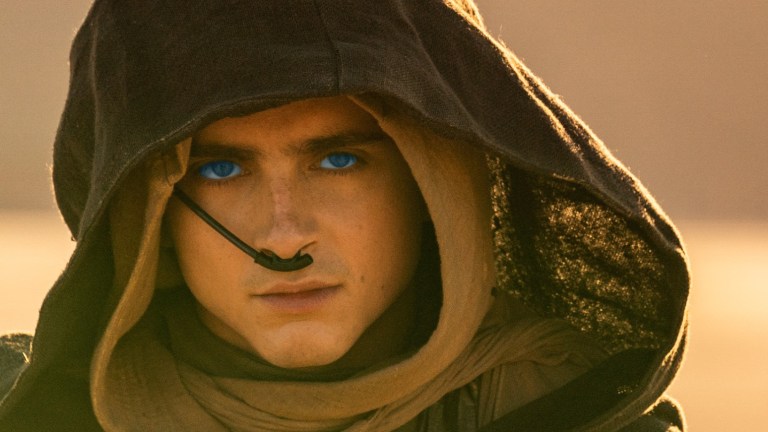Dune 2 Will Change This One Thing About the Paul Atreides From the Book
Elements of Frank Herbert's sequel book Dune Messiah will make their way into Denis Villeneuve's Dune: Part Two, especially when it comes to Paul's darker side...

Young Paul Atreides strides across the sands of Arrakis, the planet that will become the setting of his ascension. Although he has never before left his watery home planet of Caladan, the Fremen of Arakis seem to know him. “Lisan al-Gaib,” they shout at the sight of him, calling him a messiah. Although the Mentat Thufir Hawat dismisses the Fremen’s behavior as “Harkonnen’s rules,” Paul suspects the truth. His mother’s religious order, the Bene Gesserit have been seeding prophecies about him, preparing them for allegiance.
Although the above scene occurs early in Dune, it also points to a major theme across all of the Dune novels written by Frank Herbert. Paul is no mystical messiah, no god made flesh, but rather a product of social and political engineering, designed by the Bene Gesserit to create compliancy in the people.
While making the long-awaited Dune: Part Two, director Denis Villeneuve seems to be channeling his inner Bene Gesserit. Longtime fans know that Dune is just the first of writer Herbert’s novels about a far future, in which a hallucinogenic spice becomes the most important resource of the galaxy. Herbert wrote five more novels and several short stories about the characters, a lineage that has been carried on by other writers, including his son Brian and co-writer Kevin J. Anderson.
Villeneuve has been open about his intentions to adapt the second novel, Dune Messiah, despite the challenges posed by that story. And while he has suggested that he may work on a different project between Dune: Part Two and Dune Messiah, he recently revealed that he has prepared the way for the latter work with the construction of the former.
Speaking with Screen Rant, Villeneuve revealed that his interpretation of Paul includes Herbert’s own thoughts about the character, which affected his portrayal in Dune Messiah and The Children of Dune. “[W]hen Frank Herbert wrote the book, and then when the book came out, he was disappointed by how people perceived Paul Atreides,” Villeneuve explained. “At the time, he felt that people were talking about Paul as a hero, and for him, he was an anti-hero.”
One does get aspects of that interpretation in 2021’s Dune. Visions of the galactic jihad Paul initially haunt him in the first film, which leads him to accuse his mother Jessica of putting him on a path to destruction. Despite those glimpses, however, Dune largely positions Paul as a stereotypical hero. The first film ends with the loss of his father Duke Leto and his comfortable position of power, while starting to regain a new home among the Fremen.
For Part Two, Villeneuve underscores the more cynical aspects of Paul. “He was a dark figure,” explained the director. “The book was a warning for [Herbert] about a Messianic figure,” and when his first readers did not understand that, Herbert “wrote Dune Messiah to correct [that] and to make sure that people understood his intention.” As one who understands that intention, Villeneuve worked elements of the later book into his adaption of the first. “I knew that story. I had the benefit of having read Dune Messiah, so I wrote Part 2 having that in mind.”
Villeneuve doesn’t share how, exactly, he will make Paul darker in Part Two, but those of us who have also read Dune Messiah can guess that we’ll see a more pragmatic, but self-deluded version of the character, a person willing to kill thousands while still convinced he’s doing the right thing.
Furthermore, the director revealed that Paul won’t be the only character changed in Dune: Part Two. Because of the arc in Dune Messiah, Villeneuve explained, “Chani’s character is slightly different in my adaptation than in the book.” Honestly, the fact that Chani does anything at all in Herbert’s book is a distinction from the 2021’s Dune, in which Zendaya mostly stared at the screen and whispered. But if Part Two works in elements from Messiah, we may see a more power-hungry version of Chani than the innocent in Herbert’s Dune, someone who bares a grudge against her rival Princess Irulan (who will be played by Florence Pugh in Part Two) and who will do terrible things to her offspring in Children of Dune.
Just how far will Villeneuve take Paul and Chani? We’re not Bene Gesserit, so we don’t know, but we can’t wait to find out.
Dune: Part Two opens on March 1, 2024
